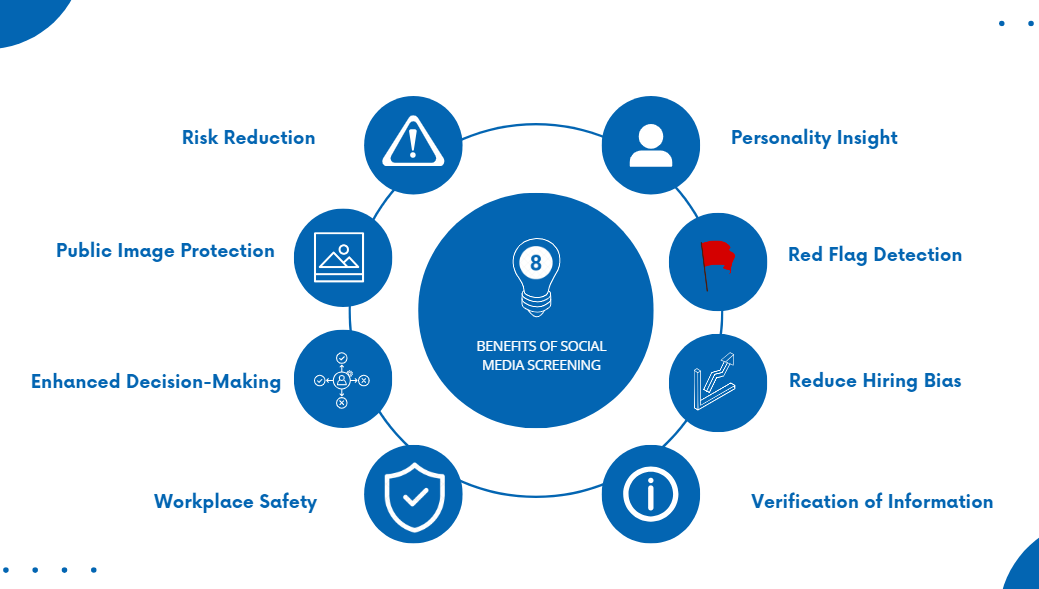8 Benefits of Social Media Screening

Social media screening has become an important tool for employers, especially in a competitive job market where finding the right candidate is crucial.
It gives them more information about candidates beyond their resumes, helping to alleviate the pain point of making hiring decisions based solely on limited information. We cover the benefits of social media screening and how it improves the hiring process.
If you're interested about how this type of background check works, check out our guide on Social Media Background Check.
What Is Social Media Screening?
Social media screening is the process of gathering and reviewing publicly available information from social media platforms to learn about the character and background of candidate.
It helps the employers to see the online behavior of candidate, providing important insights. This method is very important in hiring, as it allows employers to make smarter choices based on what candidates post and share online.
Benefits of Social Media Screening

The fact is that most employers (91%) are already evaluating candidates’ social media profiles as part of the screening process. This widespread practice reflects the growing importance of understanding a candidate's online presence.
For more information on this statistic, visit the source in fact that most employers (91%). In this section, we will explore the significant benefits of social media screening for both employers and candidates.
1- Personality Insight
Social media platforms can reveal a candidate's personality traits. Analyzing their posts, comments, and interactions provides valuable insight into their values, interests, and social behavior. This information helps employers gauge how well a candidate might fit into the company culture.
Understanding a candidate's personality matters for modern business, as it can influence team dynamics and overall productivity. Learn more about this in our article on Why Social Media Background Screening Matters for Modern Businesses.
2- Red Flag Detection
Social media screening is important for spotting red flags in the online behavior of candidate. Employers can discover inappropriate content, like unacceptable comments or signs of violent actions, that won't come up during regular interviews.
Finding these issues early allows employers to address concerns before making hiring decisions, which helps lower the risk of conflicts in the workplace.
3- Reduce Hiring Bias
Social media screening is an effective way to help reduce hiring bias. By reviewing a candidate’s online behavior, employers can assess their actions and interactions without depending solely on resumes or personal references.
This unbiased method encourages fairness in the pre phases of hiring process, allowing decisions to be based on behavior and character rather than assumptions.
Also Read: How Social Media Screening Tools Can Help Reduce Hiring Bias.
4- Verification of Information
Social media profiles can provide important context to help confirm the details in a resume of candidate. Employers can cross-check the work history of candidate, skills, and authorization on platforms like LinkedIn.
This process of verification ensures that the candidate's qualifications match their online presence.
5- Risk Reduction
Conducting social media screenings allows employers to minimize the risk of hiring individuals who might threaten workplace safety or harm the company’s reputation.
By identifying concerning behaviors early on, companies can address potential risks and maintain a safe work environment.
6- Public Image Protection
Employers are not only caring about the behavior of candidate but also about their potential impact on the public image of company. Social media screening helps ensure that new hires align with the organization's values and public expectations. This proactive approach protects the company's reputation and fosters a positive work culture.
7- Enhanced Decision-Making
Social media screening provides valuable data that can improve the decision-making process during hiring. Employers gain insights into a candidate's communication style, professionalism, and interactions with others, allowing them to make more informed choices. This depth of understanding leads to better hiring outcomes.
8- Workplace Safety
Ensuring workplace safety is paramount for any organization. Social media screening can help identify candidates who may have a history of violent behavior or inappropriate conduct online. By addressing these issues before hiring, employers can create a safer work environment for all employees.
9- Cultural Fit
Understanding how a candidate interacts online can also provide insights into their fit within the company culture. Assessing candidates based on their social media presence helps employers identify individuals who align with the organization’s values and mission.
Understanding how a candidate interacts online can also provide insights into their fit within the company culture. Assessing candidates based on their social media presence helps employers identify individuals who align with the values and mission of organization.
Also Read: Pros and cons of social media background check to gain a balanced perspective on this practice.
How Do Employers Check Social Media?
Employers use social media background checks to learn about candidates as a person, including how they conduct themselves in public and any comments they have made about their professional history. This information can significantly influence hiring decisions, making it a crucial part of the recruitment process.
How Long Does It Take for Social Media Background Check?
The duration of a social media background check can differ depending on the methods used and the platforms being examined. Employers can complete this process quickly, within a few days for efficient decision-making in the pre phases of hiring process.
What Are Social Media Screening Red Flags You Need to Consider?
When conducting social media screenings, employers should be aware of specific red flags detected on background checks, such as:
- Inappropriate language or behavior
- Posts promoting violence or discrimination
- Evidence of substance abuse
- Inconsistencies in professional information
Identifying these red flags can help employers make informed hiring decisions.
Also Read: What Causes a Red Flag on a Background Check?
What Shows Up on a Social Media Background Check?
A social media background check show various types of information, including:
- Personal posts and comments
- Photos and videos shared publicly
- Professional authorization and connections
- Any public interactions
Understanding what shows up on a social media background check is essential for both employers and candidates.
How Ferretly Can Help You in Your Social Media Screening Process?
Ferretly leads in AI-powered social media background checks, providing organizations with comprehensive solutions for screening candidates. By using advanced AI technology, Ferretly offers fast and more accurate assessments of online behavior. Request a demo today to see how our platform can enhance your hiring process.
Frequently Asked Questions
1- Do Background Checks Show Social Media?
Yes, social media accounts can be included in background checks, giving employers insight into a candidate's online behavior.
2- How Do Employers Find Your Social Media?
Employers can easily find social media accounts on their own by using your name, email address, or phone number. This straightforward method enables them to gather necessary information about candidates.
3- What Are the Effects of Social Media Validation?
The validation of social media can help ensure that candidates present themselves professionally online. This alignment can positively influence hiring decisions and workplace dynamics.
4- Do Jobs Check Your Social Media?
Yes, in most cases, employers conduct social media checks not just to find potential red flags but also to ensure that a candidate's personal brand aligns with the company's values. This practice emphasizes the importance of maintaining a professional online presence.






